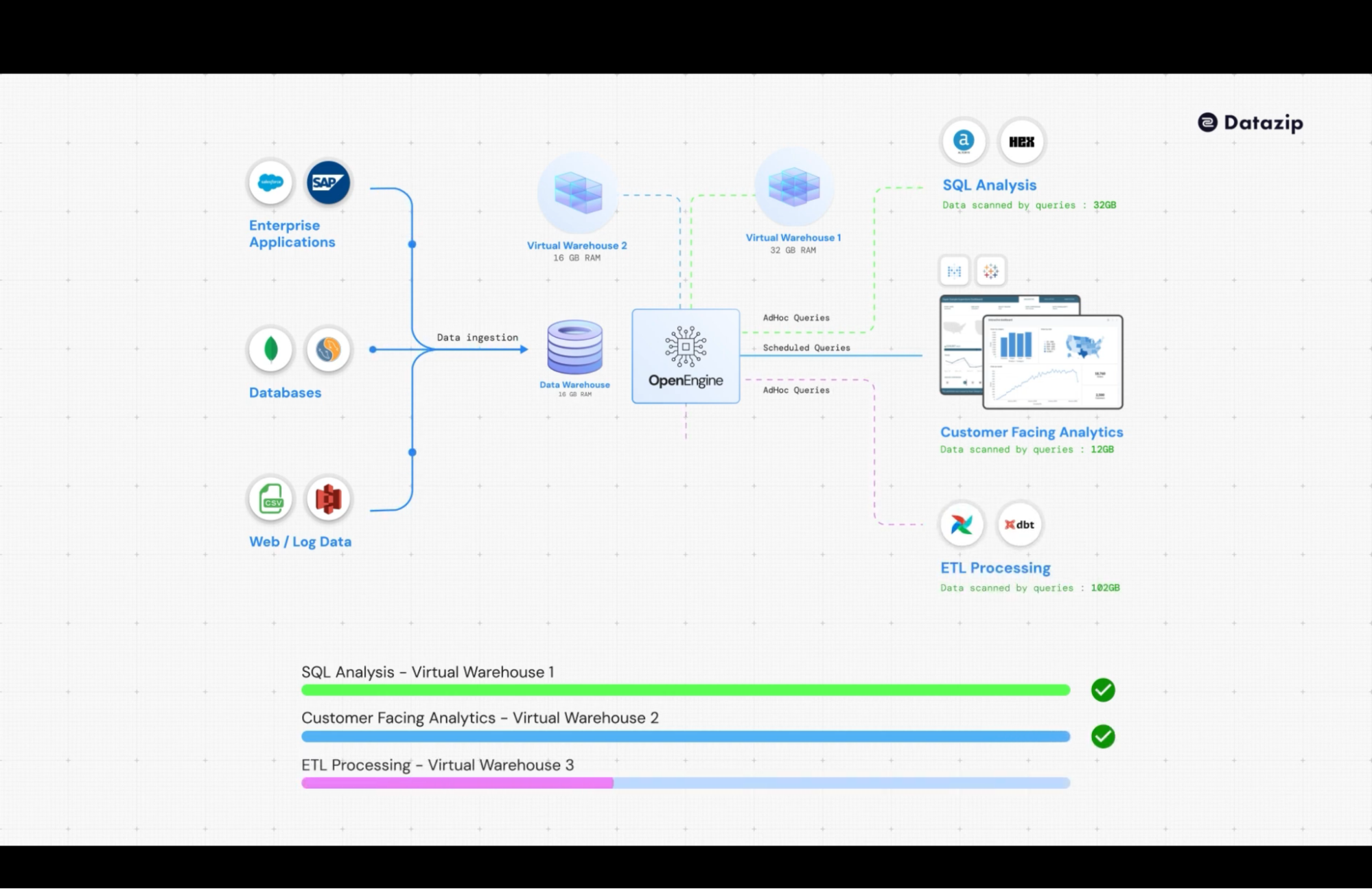OpenEngine and how it makes Out-of-Memory (OOM) free Systems
Introduction
We’ve all been there. You’re knee-deep in a data project, and suddenly a senior stakeholder needs urgent insights—yesterday. Or maybe your system is due for an upgrade, but the mere thought of downtime sends shivers down your spine.
In many data warehousing systems that lack memory tracking or query-killing mechanisms like ClickHouse, queries can run indefinitely, often leading to significant performance slowdowns. This issue becomes more pronounced when available RAM is insufficient, causing queries to drag out and impact overall system efficiency.
These are the moments when you realize the limitations of traditional data warehousing. That’s where OpenEngine, by Datazip, comes in. It’s a game-changer, built to handle the real-world challenges that data engineers and analysts face every day.
OpenEngine (OE) addresses this problem by optimizing query execution, even in low-memory scenarios. Unlike traditional warehousing systems, OE ensures that queries are processed more efficiently, minimizing the performance degradation typically caused by insufficient RAM. This makes OE a robust solution for handling heavy workloads under memory-constrained conditions.
It is a new extension of Warehouse capabilities of Datazip, which intends to provide on-the-fly read / write on our Primary Data Warehouse to access data while handling all other heavy compute on virtual warehouses.
Let’s dive into some specific scenarios where OpenEngine doesn’t just meet the need—it excels.
What to expect from this blog?
-
How compute and resource isolation helps maintain stable systems.
-
How firing concurrent ad hoc queries on demand (with other running and scheduled jobs) won’t end with OOM bottleneck.
1. Handling Urgent Ad-Hoc Queries from Stakeholders
The Challenge: We all know the pressure when a senior executive asks for a data analysis on the fly. It’s not just about the data; it’s about time. Running these large, ad-hoc queries on a traditional system can strain resources and delay other critical operations.
How OpenEngine Helps: OpenEngine lets you create virtual warehouse instances on demand. This means you can handle those urgent requests without impacting the rest of your system. Stakeholders get their answers quickly, and your main data warehouse keeps humming along without a hitch.
2. Eliminating Downtime During Warehouse Upgrades
The Challenge: Upgrading your data warehouse can be nerve-wracking. The last thing anyone wants is to take the system offline, especially when your company depends on real-time analytics for customer-facing operations.
How OpenEngine Helps: OpenEngine’s architecture allows you to spin up larger data warehouse servers as needed and seamlessly stream data from the main instance. No downtime, no disruptions—just a smooth transition to a more powerful system.
3. Optimizing Resource Utilization and Cost
The Challenge: Over-provisioning resources to handle peak loads is like renting a mansion for a party that might happen once a year. It’s costly and inefficient.
How OpenEngine Helps: With OpenEngine, you only pay for the resources you actually use. Its on-demand scaling capabilities mean that compute resources are spun up when needed and shut down when they’re not by setting idle timeout limit. This ensures you’re not wasting money on unused capacity, making it perfect for businesses with unpredictable query demands.
4. Isolating Workloads for Performance and Stability
The Challenge: In a shared environment, one heavy query can slow down everything else, frustrating other users and impacting critical operations.
How OpenEngine Helps: OpenEngine allows you to separate workloads by assigning specific queries to dedicated virtual warehouse instances. This ensures that resource-intensive operations don’t interfere with other processes, keeping everything running smoothly.
5. Enabling Smooth Operations for Data-Intensive Industries
The Challenge: Industries like finance, logistics, and healthcare rely on real-time data analysis to make decisions. Any disruption can lead to significant financial losses and operational bottlenecks.
How OpenEngine Helps: OpenEngine’s ability to provide uninterrupted data access for you to connect to BI tools, even during peak loads, makes it an ideal solution for these industries.
Features like ad-hoc compute scaling and workload separation ensure consistent performance and high availability, which are crucial for mission-critical operations.

Resource Isolation using OpenEngine
With OpenEngine enabled:
-
Datazip achieves storage and compute isolation.
-
Data warehouse acts just as a storage unit.
-
Virtual Data Warehouses are spinned up on adhoc basis as and when needed.
-
OpenEngine parses SQL queries and spins up intelligent virtual warehouses [under 30 seconds] to compute the queries with a set IdleTimeout to kill the machine when idle.
-
The virtual warehouse then communicates with our primary data warehouse to fetch the data required for computation [not shown in the diagram for better readability].
-
Scale up and down your virtual warehouse as and when required from the in-built UI.
With OpenEngine disabled:
- Our Primary data warehouse acts as a storage unit and compute machine.
Implications of Ad Hoc Query Requests for Analysts:
Analysts will be provided with the ability to configure the underlying machine's scale within the range allocated by the administrator, ensuring that AdHoc queries do not interfere with other operations, hence the resource isolation advance.
Impact on Business Intelligence:
To guarantee that all dashboards load within the specified time frame, we will proactively identify the memory required at the chart level and cumulatively at the dashboard level. When a dashboard is loaded, an appropriate warehouse instance will be assigned to execute it.
Key Takeaways
-
Ad-Hoc Queries: Handle urgent requests without disrupting your main operations.
-
Zero Downtime Upgrades: Seamlessly upgrade data warehouse without taking your system offline.
-
Cost Efficiency: Pay only for the resources you use, thanks to dynamic scaling.
-
Workload Isolation: Keep your operations stable by isolating heavy workloads.
-
High Availability: Ensure uninterrupted service for data-intensive industries, even during peak times.
Conclusion
OpenEngine isn’t just another data warehousing tool—it’s a solution designed with the real-world challenges of data professionals in mind. Whether it’s handling those last-minute queries from the C-suite, upgrading your systems without a hitch, or ensuring your operations run smoothly during peak loads, OpenEngine steps up where traditional data warehouses fall short.
So, the next time you’re faced with a data challenge, remember that there’s a better way to manage your workloads, scale on demand, and keep everything running without a hiccup. OpenEngine is here to ensure you don’t just meet the needs of today’s data-driven world—you exceed them.
